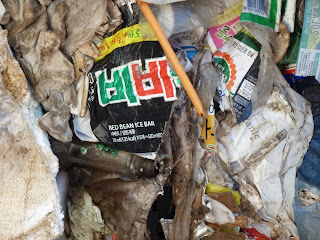EcoWaste Coalition, Samahang Sining at Kultura ng Pilipinas, Advocates for Environmental and Social Justice
Free the Earth of plastic pollution! – green groups
A day before the world celebrate this year’s Earth Day, themed “End Plastic Pollution”, Samahang Sining at Kultura ng Pilipinas (SSKPil), Advocates for Environmental and Social Justice (AESJ) and zero waste advocacy network EcoWaste Coalition joined the rest of the world in calling for an end to plastic pollution.
“It is high time that we free the earth of plastic pollution!” cried the groups during a local two-day Earth Day celebration in Pandacan, Manila, dubbed the Good Earth Day Festival, which was organized by SSKPil in partnership with AESJ and EcoWaste Coalition.
“We are one with nature! What we do to it, we do to ourselves! We pollute it; we pollute ourselves,” lamented Annabelle J. R. Lopez, President of SSKPil, highlighting this year’s theme for the two-day Pandacan event that starts today, “Iisa ang Tao at ang Kalikasan” (Humans and Nature are One).
“Unless we seriously pursue plastic use avoidance and reduction, our children, the future generation will end up playing and walking on plastic wastes sooner or later!,” Lopez continued.
According to the groups, plastic pollution happens when plastic materials are not properly managed, such as by throwing them away or burning them, instead of ecologically managing the same as mandated by the Ecological Solid Waste Management Act of 2000 or Republic Act 9003.
“Plastics can be found almost anywhere and have started to engulf even our waterways beaches and popular tourist spots, places which are supposedly protected from such unwarranted intrusions especially from pollutants,” noted Sixto Carlos, AESJ founder and Board member of SSKPil.
"In Pandacan where we are making efforts to revive Beata River, along the historic romantic river of Balagtas and Celia, one finds never ending piles of plastic items floating among other debris," continued Carlos.
EcoWaste Coalition Zero Waste Program Officer, Daniel Alejandre, for his part, noted that data from a 2017 waste audit conducted by the international anti-plastic pollution movement Break Free From Plastic along the beaches of Freedom Island, Paranaque City, a protected area, showed that “almost 50% (49.33%) of wastes from collected samples comprise of plastics, 82% of which are disposables.”
The more than 16-year old RA 9003 provides that ‘solid waste avoidance and volume reduction through source reduction and waste minimization’ be among the major policies that should be instituted by local governments, which are the main actor in implementing the said law.
To deal with plastic pollution, the groups highlighted the necessary mainstreaming of zero waste programs and strict implementation of RA 9003 that should start at the barangay level.
The groups continued that Industries can do a lot and should do its part in stopping plastic pollution at the point of manufacturing.
“Industries should green and clean their production processes so that products that they make are safe, non-toxic, and environmentally acceptable,” the green groups voiced out.
All the while, RA 9003 provides for the prohibition on the use of non-environmentally acceptable products, which, according to the law, are those that do not possess the quality of being re-usable, biodegradable, recyclable, and non-toxic to the environment.
“Industries should also institute extended producer responsibility to ensure that each product, at the end of its useful life, return to its manufacturer for appropriate management,” concluded the groups.
-end-
References:
Break Free From Plastic, Waste and Brand Audit in Freedom Island, Powerpoint Presentation, 2017
Ecological Solid Waste Management Act of 2000
https://www.facebook.com/event s/131913394188262








Comments